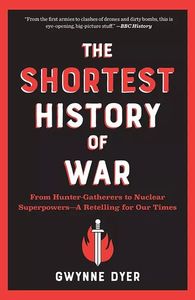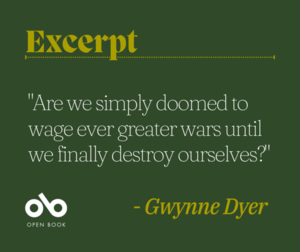Excerpt: Gwynne Dyer's The Shortest History of War Details the Two Surprising Conditions that Predict a Species' Likelihood to Wage War
Historian and military expert Gwynne Dyer has written about the Iraq war, climate change, and the very invention of war as we now understand it. His acclaimed television series have won awards, and his classic book War has been reissued numerous times.
His newest offering is the pithy and fascinating The Shortest History of War: From Hunter-Gatherers to Nuclear Superpowers - A Retelling for Our Times (Cormorant Books), which shows the role of war from the dawn of humanity to our current landscape of countries competing on a ever-more technology-centric playing field.
He takes readers on a speedy journey from early cities to the history of war prior to the invention of firearms. After that tipping point, he charts history's course to the 18th century concept of "total war", culminating in the tragedy of Hiroshima.
With Russia's war in Ukraine representing a halt to the longest period of peace between global powers since the Second World War, understanding where we currently stand, and what our technological capabilities mean for the future of war, is more pressing than ever. Dyer's gift for taking information that might seem overwhelming or dry in other hands and making it urgent, clear, and impactful makes The Shortest History of War essential reading.
Today we're sharing a short excerpt from the book, courtesy of Cormorant Books. Here Dyer details the two surprising requirements for a species to engage in war-behaviour, and explains how and why we, as humans, fit both criteria.
Excerpt from The Shortest History of War: From Hunter-Gatherers to Nuclear Superpowers - A Retelling for Our Times:
Do we bear the mark of Cain? Are we simply doomed to wage ever greater wars until we finally destroy ourselves? Not necessarily. But we do meet the two conditions needed to account for the warlike behaviour of any species toward other members of its own kind: Is the species predatory, and does it live in groups of variable size?
We and our ancestors have been hunters for millions of years, and we can therefore easily kill other human beings. Indeed, we have been able to kill even the largest animals for at least a couple hundred thousand years, so we definitely tick the “predator” box. (Chimpanzees, who regularly hunt, catch, and eat monkeys and other small game, are the only other primate species to tick that box—and also the only other primate species that fights wars.)
On the face of it, “living in groups of variable size” is a more puzzling requirement, but it works like this. Solitary predators rarely engage in serious fights with other members of the same species, because there’s about a 50 percent chance of death in such an encounter, and it’s just not worth it in evolutionary terms. In any case, warfare is by definition a group activity. But if those groups are all of similar size, and their members stick together, the likelihood of a head-on battle is equally low: they would be more or less evenly matched, there would be lots of deaths, and any victory would be pyrrhic.
By contrast, groups of variable size, which must sometimes split up into smaller groups or single individuals to forage, present opportunities for ambushes in which the odds will be very much in favour of the attackers. Attritional warfare is thus possible between such groups, and although the attacks are mostly opportunistic, they may result in the extermination of all the males in one of the groups. Lions behave like this, and wolves and hyenas too, and of course chimps and humans—all predators that live in groups of variable size. But what benefit are the winning groups actually getting out of this? What evolutionary advantage does it confer?
The world was never empty, and food has always been limited. Whether the environment is desert, jungle, seashore, or savannah, both the predator and the prey species will tend to breed up to the carrying capacity of the environment—and a bit beyond it. Human hunter-gatherers often practised infanticide as a form of birth control, but the decision to expose the infant seems generally to have been taken by overburdened parents, not imposed as a matter of band policy. It probably didn’t slow population growth very much.
Your CanLit News
Subscribe to Open Book’s newsletter to get local book events, literary content, writing tips, and more in your inbox
If your band is living up around the maximum carrying capacity of the local environment, even a brief interruption in food supply (e.g., changes in the weather pattern or in animal migration routes) will create an instant crisis, since most of the foods people eat cannot be stored. In a matter of weeks or months everybody is hungry all the time, and since human beings are gifted with foresight, they know what lies ahead for most of the group if this goes on. But if your band has been systematically culling the adult male population of the neighbouring band by serial ambushes for a long time, it may now have the option of going for broke, exterminating the rest of the neighbouring band’s males, and taking over their food resources to get you through the crisis.
Evolution is not driven by rational calculation, and the chronic warfare that fills our prehistory was not consciously designed as a device for ensuring the survival of our own genetic line. But to explain it, you only have to assume that there was always some degree of competition for resources between neighbouring bands, even in good times, and that in bad times some groups might be driven to violence. Whether for cultural or genetic reasons, some bands will be at least marginally more aggressive than others. Those are the bands that are likeliest to survive when the resources get scarce, and to pass on both their culture and their genes to the next generation.
_______________________________________________
This excerpt is taken from the book The Shortest History of War by Gwynne Dyer, published by Cormorant Books Inc., Toronto. Copyright 2022 © Gwynne Dyer. Reprinted with permission.
Gwynne Dyer has worked as a freelance journalist, columnist, broadcaster, and lecturer on international affairs for more than 20 years, but he was originally trained as an historian. Born in Newfoundland, he received degrees from Canadian, American, and British universities, finishing with a Ph.D. in Military and Middle Eastern History from the University of London. He served in three navies and held academic appointments at the Royal Military Academy Sandhurst and Oxford University before launching his twice-weekly column on international affairs, which is published by over 175 papers in some 45 countries. His television series War was aired in 45 countries in the mid-80’s. His 1994 series The Human Race and Protection Force both won Gemini awards.
Dyer’s books include Ignorant Armies: Sliding into War in Iraq (2003), Future: Tense (2005), and The Mess They Made: The Middle East After Iraq (2007), all of which were number one or number two on the Globe & Mail’s nonfiction best-seller list. He is the author of Climate Wars, based on his recent series of the same name on CBC Ideas and Crawling from the Wreckage. His newest book is The Shortest History of War: From Hunter-Gatherers to Nuclear Superpowers - A Retelling for Our Times.






